- Home
- Julie Berry
Lovely War Page 7
Lovely War Read online
Page 7
James tried not to laugh.
“But I do wish I could do something to help. Not just sit at home practicing audition pieces while the boys are over there, dying.”
The lights dimmed. The roar of the crowd settled to something like a rumbling purr.
James leaned in closer and spoke into her ear. “Keeping the world safe for people to practice their audition pieces seems like the one good reason to fight this war. If music stops, and art ceases, and beauty fades, what have we then?”
He watched her long lashes open and shut. This beauty before him would never fade.
(It’s one of my most useful little lies.)
In the dim hall, lit only by stage lights, their copper-colored faces searched each other.
Kiss her. Do it.
The musicians began tuning their instruments. The spell broke. A master of ceremonies welcomed everyone and announced the program. Then the conductor, a Mr. Landon Ronald, took the stage, and the orchestra rose. Applause filled the Royal Albert. Mr. Ronald bowed, the orchestra sat, and the great hall sank into silence.
Then, the music began.
James and Hazel closed their eyes and let the music wash over them. Sonorous brass in slow, solemn chords. Woodwinds chasing one another in lilting ribbons of sound, swirling around the balconies. Then brass and winds together. A marcher and a dancer. A soldier and a piano girl.
Hazel pulled pulsing sound into her lungs. Beside her, a grave-eyed young man made the air crackle around him. She made a wish. Let tonight never end. Let the music play on and on.
James had attended concerts but nothing like this. The sound, surrounding him, passing through his body. Each tone, so alive, so pure, so mighty.
Hazel glanced sidelong at him, and saw him breathe in time with the music. She saw tears well at the rims of his dark eyes.
This one, she decided. This lad, for me.
And it was done.
APHRODITE
Concert, Continued—November 25, 1917
THE PIANO SOLOIST, a Miss Adela Verne, played her first solo, a Hungarian fantasy by Liszt. To James’s mind, Miss Verne played as masterfully as any man might. He’d hoped Hazel would be especially interested to see a woman pianist in the solo role.
Catching Hazel’s eye, he pointed down to the stage. “How would you like to perform for this crowd on that piano?”
She smiled. “There you are with that question again.”
He leaned closer. “What color gown would you wear?”
She gave him a funny look. “Black, of course. Pianists aren’t opera singers.”
“So you’d do it, then?”
“I’m nowhere near as talented as you seem to think.” She smiled. “I’m just a girl, like countless others, who plays the piano.”
James watched her long, slender fingers on her lap. “But after conservatory studies?”
She shrugged. “If I want to end up on that stage, a conservatory is essential.” The statement was very much an if. “My parents work so hard, and sacrifice so much, for me to have lessons we really shouldn’t be able to afford.” She gazed at the grand piano onstage. “They have such hopes for me. I owe them everything.”
He couldn’t pinpoint the source of her reluctance, so he said nothing.
She thought a moment. “If I could come here alone in the middle of the night,” she said, “and shine just one spotlight on that piano, and play for the darkness, I’d like that very much.”
James watched her curiously. “Alone?”
She nodded. “Think how romantic, to play in the dark, with only this great hall, that has heard so much, for an audience.” She rubbed her arms. “It gives me goose bumps.”
“Why no people?”
Mr. Landon Ronald made yet another entrance to loud applause.
“People get in the way.”
He lowered his voice as the conductor raised his baton.
“I’m not people, then,” he said, “because I’d be there. I wouldn’t miss it.”
She took his hand and gave it a squeeze. “We’ll see.”
Piece after exquisite piece of music peeled away. Dvořák and Alkan and Paderewski and Saint-Saëns. Some concertgoers might have felt the performance was long, but not James. Not Hazel. They applauded at the finale, lingered as long as they dared, then made their way through the throng and out into the cold twilit air. They turned toward the train station.
“Stop for tea, then?” James asked.
Hazel shook her head sadly. “I’d better not. I . . . er . . . I didn’t tell my parents where I was going this afternoon.”
His mouth hung open. “You what?”
She looked at the ground. “I will tell them,” she said. “I just didn’t see a way to do it.” She glanced up at him. “My folks, they’re lovely. I can’t believe I’m doing this. I do think they’ll like you, once they get to know you.”
“Thanks.” James laughed. “I’m an acquired taste, then? Takes a bit of patience?”
She flushed, and elbowed him lightly in the ribs. “Stop that!”
“Stop what?”
“Teasing me.”
He stopped walking and turned to face her. She shivered a little in the cold, and he instinctively reached his hands up to cradle her face and keep it warm.
KISS HER.
Hazel held her breath. His brown eyes were so beautiful. Surely he would kiss her now.
He didn’t. Maybe, Hazel realized with awkward horror, he was waiting for an explanation about her parents. So she gave him one.
“My dad is very protective of his ‘little girl,’” she explained, “and my mum is terrified of life in general. She’s always telling me horror stories about what happened to so-and-so’s daughter who fell in with a worthless, no-good chap, and on and on.”
“Worthless and no-good,” James echoed.
Hazel held up a firm hand. “Now, you stop right there,” she said. “You know that’s not what I’m saying.”
He grinned and admitted that he did know that.
“Dad’s always warning me against soldier boys, too,” she said. “And . . . I can understand why he would. He doesn’t want me getting hurt.”
James stroked the pads of his thumbs softly across her cheekbones.
“I will never hurt you, Hazel Windicott.”
She came very close then to kissing him herself.
“I know,” she whispered. “Not if you could help it.”
Neither could find words for all they didn’t dare say.
Finally she mumbled something about the cold, and he mentioned their train. They broke apart and resumed walking, then reached the station and boarded their train.
“Anyway,” she said, resurrecting an abandoned conversation, “I knew if I told my parents about you, they’d insist on meeting you, and on chaperoning our time, and on limiting it to whatever they felt was proper. Which wouldn’t be anywhere near enough.” She looked earnestly into his dark eyes. “We only have one week. I don’t want to waste any of it.”
If it weren’t for the prying eyes of a plump older woman across the aisle, James would’ve enfolded Hazel in his arms then and there.
“I feel I could tell you anything,” he told her. “Sometimes I think I already have.”
True, and false. He couldn’t tell her what he really felt.
“Then why,” she said, “haven’t you kissed me yet?”
All her limbs clenched, as if, maybe, by sheer muscular will, she could pull back those words and unsay them. But James let the nosy older woman be hanged and slipped his arms around Hazel and drew her close.
“Oh, don’t worry,” he told her. “I have every intention of kissing you.”
His face was an inch from hers.
She took a deep breath.
Nothing happened.
/> If he was trying to kill her through kiss deprivation, it was working.
She tried to sound nonchalant. “Every intention, eh?”
He nodded, very seriously, but with a twinkle in his eye.
“I’m planning it carefully,” he said. “Can’t rush these things.”
“Actually,” she said, “one can. If one wants to.”
She saw the texture of his skin and the dark stubble forming on his chin. She saw his teeth—quite nice teeth—and the adorable dimples, when he smiled.
“I will kiss you, if I may, Miss Windicott,” he told her, “on the train platform at Charing Cross next Saturday. Before I set off overseas.”
I don’t like delays. I was not amused.
Hazel, however, was. She began to laugh, and the shape of her smile nearly made James abandon his plan of waiting. He pressed his cheek against hers. Just like when they’d danced.
“I appreciate the advance notice,” she said. “I can dress for the occasion.”
“It’ll be a kiss to remember,” he told her. “I’ll make sure of that.”
Hazel laughed in his ear. “You’d best remember to do it, then.”
“I won’t forget.”
She pulled back, with difficulty, and met his eyes.
“Out of curiosity,” she said, “why then? To be like the photos in the papers, of soldiers and sweethearts kissing goodbye at the station?”
He shook his head.
“I need a reason,” he said, “to go to the train station. Something to look forward to about that day.”
She didn’t know it, but she felt it; Ares, you were the man seated in the row behind them. The War and all its finality prying its cold fingers in between them.
“Besides,” he said, “if I kiss you before then, I may never get on that train.”
APHRODITE
Torture—November 25–26, 1917
THEY SAID GOODBYE. It was torture.
Hazel went inside and faced her parents. It was torture.
She returned home, not to anger, but worse, to betrayal and disappointment.
James returned home to a telegram.
James and Hazel had made plans to see each other at lunch the next day. Waiting all night and all morning for luncheon was torture.
But it was nothing compared to her torture, the next day, waiting at the café where they said they’d meet, for James not to appear.
Nothing, compared to James’s torture, watching the gray sky out the window of a morning train bound for Calais, there to board a ship for Boulogne, and from there, a train to Étaples for training at the British Expeditionary Force base camp.
Nothing compared to the torture for Hazel of receiving a letter, that afternoon at her flat, explaining he’d been summoned to report days earlier than expected. Prime Minister Lloyd George and Field Marshal Haig had an urgent need for new men to replace casualties at the Front. Private James Alderidge, someone in a war bureau had decided, would do as well as any.
APHRODITE
First Night—November 26, 1917
THE CHANNEL STRETCHED between James and Hazel that night. It looks narrow on a globe, but when it divides two hearts, it might as well be the mighty Atlantic.
Hazel paced her bedroom. Her flannel robe, she clutched tightly across her ribs. Her nightgown couldn’t keep her warm. A bitter cold wind blew in from the Continent, from France. Cold enough to chill a girl in her bedroom; how much more a soldier on a boat or in a tent?
She’d seen pictures, films even, of British soldiers, row upon row, marching. An impressive sight, majestic in size and discipline and uniformity. It made her tremble to realize that now, out there, one of those immobile faces would belong to her James. His dear mind and heart, trapped inside that khaki cage. His warm body, tall and graceful, the target of a speeding lump of German steel.
It would be nice, at a time like this, if she could cry. Get it all out in a big rain of tears and finally drift off to sleep. Tears were better by far than the tightness in her throat and the lead weight in her stomach.
She paced the room.
Friday, Saturday, Sunday. One weekend. Only that. A lifetime, crammed into three days.
Monday, Tuesday, Wednesday, Thursday, Friday, and a Saturday kiss, stolen away.
If her heart could entwine so completely around his in three days, what would have happened after a week? What words would’ve passed between them? What memories created? What promises exchanged?
Was all of this nothing more than a dream one gradually forgets upon waking?
She sank upon her bed. Stop this, my girl, she told herself. You’ll drive yourself mad.
She closed her eyes and wrapped her arms around herself. She took herself back, back to the Royal Albert, to the train, to the walk, the other walk, the tea shop, the dance. Bay rum and wool, a clean shave and soft, steady brown eyes. Dark hair and dimples. Warmth rushed upward from her belly to her head, and tingles shivered down her spine.
It was real and true. However new, however young.
The war was hers now. It was inside her. No more a matter of headlines and jargon.
“God, keep him safe,” she whispered. But it was out of my hands.
Poor lamb.
* * *
James had had the day’s travels to distract his thoughts, but they failed him. He couldn’t bring himself to make conversation with fellow soldiers. All around him, on train and ship, young men talked and laughed as if they were all bound on holiday. A grand game of playing soldier.
James wasn’t going anyplace. He was only leaving Hazel. Leaving her, and leaving her, and leaving her still some more.
They arrived at night at a base camp, drank lukewarm beef broth, then followed a commander to a field of tents. They were barely warmer than the bitter night, but canvas flaps kept the wind out, and eighteen men sleeping three deep in bunks added some body heat.
He slid out of his pack, kicked off his boots, and climbed into bed. It felt like hours before he generated any warmth under his blankets. He couldn’t have slept anyway.
He tried to remember what it felt like, holding Hazel in his arms.
Fool, he told himself. You should’ve kissed her while you had the chance.
Precisely what I was thinking, but I’m not one to say I told you so.
Could it even have been possible for this lovely, lovely girl to decide to favor him, James Alderidge from nowhere, with her laughter, her company, and the way she ate lemon cake? That he should be the one to hold her hands and watch her lashes sweep each time she blinked?
Now that he’d found her, how could he let himself be carried away from her?
He’d never have met her, if it wasn’t for the war. And now the war had torn them apart.
“The War giveth, and the War taketh away. Blessed be the name of the War.”
His vicar back home would’ve had a swift comment on such blasphemy. James still remembered his cousin Will’s funeral. Vividly. Ashes to ashes, dust to dust. The Lord giveth, the Lord taketh away. . . .
“God, bring me home to her,” he whispered. “Please.”
* * *
You may ask me, as others have done before, whether it was kindness or cruelty to allow them to meet, so soon before his departure, with so little time to discover each other. Whether the pangs of loss do not invalidate the bliss of love. Especially where war is concerned, and Death runs rampant with his bloody scythe. You may say that it was wicked of me to allow James to find Hazel, and Hazel, James, if three days were all they would have.
I don’t call it cruelty.
I do not apologize.
ENTR’ACTE
December 5, 1917
Dear Miss Windicott,
I hope you’ll excuse my writing to you without permission. There’s so much I’ve wanted to tell you. Nothing
short of a court-martial could’ve made me board that train. If I hadn’t gone to war, I wouldn’t have met you. If I hadn’t met you, I wouldn’t now be missing you so terribly.
I had hoped, with my experience in building, that I’d be selected for the Royal Engineers, but I’ve been assigned to an infantry division. I’ve been here nearly a week. Training isn’t as bad as I feared. The testing occupies my mind, and marching keeps a body warm. Sleeping in tents is miserable. We’re miles from the Front, but the guns echo night and day. One bright spot is making comrades of my squadron. I expect some will come to be good friends.
Our days are mostly drilling and marching in the bull pen. Watching the convoys arriving with wounded men from the Front is hard. Some kind of sickness is spreading, and trainees do go down with coughs and fevers from time to time. So far, I am hale and hearty.
Write, if you will, and tell me about ordinary life. It will help me to picture a world outside this dirty camp. Tell me about you, your growing-up years, your parents, your adventures at school, your pastimes. I feel I know you so well and yet hardly know you at all, so please, help me fill in the missing bits. Tell me what you like for breakfast, and what you would name a dog.
Your friend,
James
* * *
December 11, 1917
Dear James,
I would name a dog Pepper. I always wished for a dog. When I was young, I read storybooks about a boy named Willie and his splendid dog, Scout. I used to imagine myself on those adventures, and Scout sleeping at the foot of my bed. Most of my childhood, when I wasn’t practicing scales, was spent curled up with a book. I always wished for siblings.

 The Amaranth Enchantment
The Amaranth Enchantment Secondhand Charm
Secondhand Charm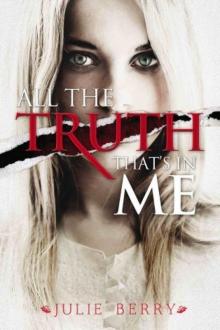 All the Truth That's in Me
All the Truth That's in Me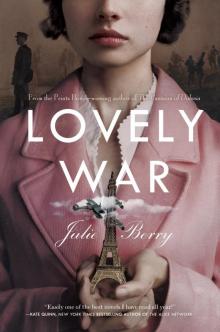 Lovely War
Lovely War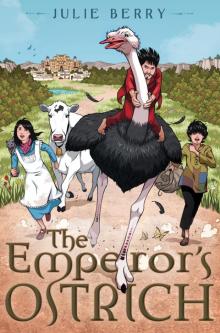 The Emperor's Ostrich
The Emperor's Ostrich The Passion of Dolssa
The Passion of Dolssa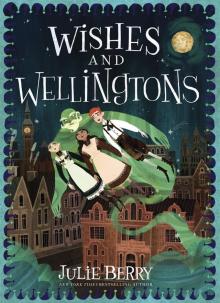 Wishes and Wellingtons
Wishes and Wellingtons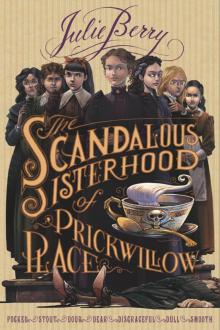 The Scandalous Sisterhood of Prickwillow Place
The Scandalous Sisterhood of Prickwillow Place Amaranth Enchantment
Amaranth Enchantment